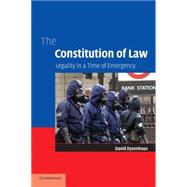
The Constitution of Law: Legality in a Time of Emergency
by David DyzenhausBuy New
Rent Textbook
Used Textbook
We're Sorry
Sold Out
eTextbook
We're Sorry
Not Available
How Marketplace Works:
- This item is offered by an independent seller and not shipped from our warehouse
- Item details like edition and cover design may differ from our description; see seller's comments before ordering.
- Sellers much confirm and ship within two business days; otherwise, the order will be cancelled and refunded.
- Marketplace purchases cannot be returned to eCampus.com. Contact the seller directly for inquiries; if no response within two days, contact customer service.
- Additional shipping costs apply to Marketplace purchases. Review shipping costs at checkout.
Summary
Table of Contents
| Acknowledgements | p. ix |
| Table of cases | p. xi |
| Table of statutes | p. xiv |
| Introduction | p. 1 |
| Legality in a time of emergency | p. 17 |
| Introduction | p. 17 |
| Judges and the politics of the rule of law | p. 20 |
| Carl Schmitt's challenge | p. 35 |
| Parliamentary or judicial supremacy? | p. 54 |
| The moral resources of law | p. 60 |
| Constituting the legislature | p. 66 |
| Constitutional positivism | p. 66 |
| The Communist Party case | p. 72 |
| Canada's common law bill of rights | p. 87 |
| Anxiety about judicial review of legislation | p. 89 |
| Disobeying Parliament | p. 102 |
| Evisceration | p. 107 |
| Reconciliation | p. 108 |
| Deference | p. 118 |
| Taking the administrative state seriously | p. 121 |
| Recognizing rationality | p. 121 |
| Maintaining the rule of law | p. 129 |
| Emerging from the shadows | p. 149 |
| In the black hole | p. 160 |
| The unity of public law | p. 174 |
| Introduction | p. 174 |
| The Belmarsh decision | p. 175 |
| Refuting dualism | p. 190 |
| Slack holes and the rule of law | p. 196 |
| The rule of good law | p. 220 |
| Bibliography | p. 234 |
| Index | p. 242 |
| Table of Contents provided by Ingram. All Rights Reserved. |
An electronic version of this book is available through VitalSource.
This book is viewable on PC, Mac, iPhone, iPad, iPod Touch, and most smartphones.
By purchasing, you will be able to view this book online, as well as download it, for the chosen number of days.
Digital License
You are licensing a digital product for a set duration. Durations are set forth in the product description, with "Lifetime" typically meaning five (5) years of online access and permanent download to a supported device. All licenses are non-transferable.
More details can be found here.
A downloadable version of this book is available through the eCampus Reader or compatible Adobe readers.
Applications are available on iOS, Android, PC, Mac, and Windows Mobile platforms.
Please view the compatibility matrix prior to purchase.
